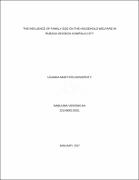| dc.description.abstract | Families provoke different levels of welfare; the ways in which families influence well-being are often difficult to comprehend; a small family size is believed to aid in adequately catering for the needs of its members; for it enables it members to enjoy the necessities of life for instance:- a choice to afford and enjoy identifiable luxuries of life, however; a larger family size comes with some adverse implication such as poor health, low incomes and status, low levels of education, pressure on environmental resources due to over exploitation, poor childcare and nutrition. Many studies (Arthur, 2005; Beker, 1991) and others have established the drivers to this and others pointing to the opposite of this claim; nonetheless there are claims remaining unanswered; this study pursues to find the influence of family size on household welfare in Lubaga Division Kampala City.
A systematic way of gathering data from the population was undertaken so as to understand the phenomenon hence to generalize facts obtained from a larger population. The study employed a qualitative approach with a case study design. It used this design to gather information from a sample size of thirty two respondents, comprising of population categories of head of family either male or female, local village leaders (LC1’s), church leaders and Community Development Officer (CDO). It collected data from these categories using the questionnaire and interview guide methods. These were later analyzed using quality control methods which involved reliability and validity measurements and presented after editing, coding, classification, tabulation and transcription using tables and graphs.
The key findings indicated that the populace was ignorant of the benefits of a small family size believing that male sex is the dominant sex, children help parents in their old age, having a big number of children is prestigious; a sign of wealth and a command for respect, however; not putting in mind that family size determines the economic background of the populace in terms of attaining health care, education, sanitation, feeding and in a nut shell welfare of the family, community and country at large.
Knowledge of strategies to curb family size were recommended; incentives such as lower school fees hospital fees be extended to small families, education concerts and theaters promoted, creating a gender balance especially when it comes to decision making in families and religious institutions intensifying on the need to maintain good household welfare. | en_US |


